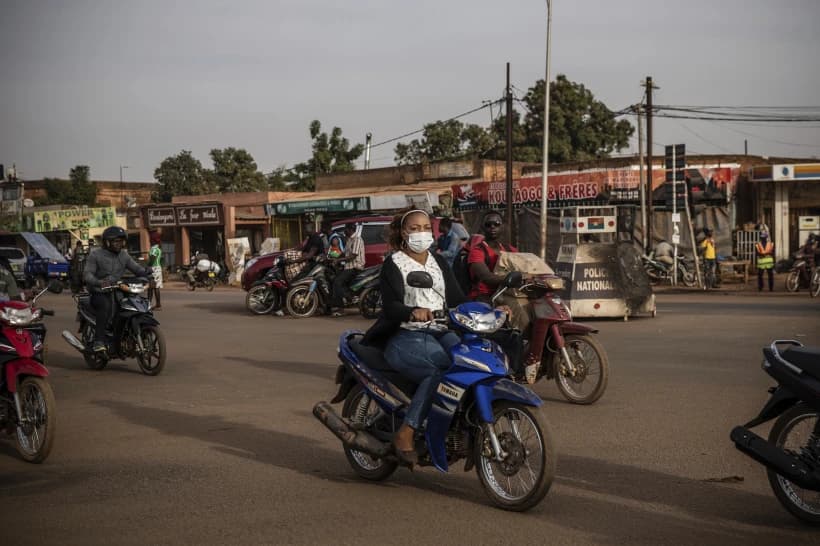YAOUNDÉ, Cameroon – Cardinal Pietro Cardinal Parolin has praised authorities in Burkina Faso for their effort to regain control of the country, which has suffered attacks by Islamist terrorism.
The Vatican’s Secretary of State was speaking Monday after discussions with the country’s Transitional Leader, Captain Ibrahim Traoré.
Until 2015, Burkina Faso was a relatively peaceful country, but the rise of militant groups in neighboring Mali and Niger such as al-Qaeda and the Islamic State in the Greater Sahara, coupled with internal political strife, exposed the country to violence, which was made worse by porous borders.
The situation worsened after two military coups in 2022, leading to increased militant activity around the capital, Ouagadougou.
The government of Burkina Faso says thousands of lives have been lost and over two million people displaced.
The Vatican’s top diplomat met with Traoré on Feb. 17 marking 125 years of evangelization in Burkina Faso, but their discussions went beyond that event.
“I would like to express my joy and satisfaction to be received by the President of the Republic and also to have meetings with the other authorities of the country in this context of the celebration of the 125th anniversary of the evangelization of the country. I came for this reason, but also to have meetings and dialogues with the authorities of the country. I would like to extend Pope Francis’s best wishes for Burkina Faso, for the population and for the future of this country,” Parolin said.
“We have good relations between the Holy See and Burkina, based on mutual respect, tolerance and fraternity, which also leads to common actions in favor of the population, especially the most vulnerable, and to meet the material and spiritual needs of the population,” he said.
Burkina Faso is located in Africa’s Sahel region, which separates North Africa from Sub-Saharan Africa. The country has one of the largest Christian populations in the Sahel, making up nearly a quarter of the population.
“We talked a lot about peace and the fight against terrorism, about the will of the government to regain control of the territory,” Parolin said.
By the government’s own admission, about 30 percent of the country’s national territory is still controlled by terrorists.
“It’s a kind of asymmetric warfare. And so it’s very difficult when you have to fight an enemy that can actually disappear within communities or use the communities as a cover,” said Remadji Hoinathy of the Institute for Security Studies.
“If you examine asymmetric warfare globally — whether it’s al-Shabaab in Somalia, the Taliban, or Daesh in Asia — even powerful military nations like the U.S. find it challenging to overcome such groups. It requires significant time, resources, and patience. Moreover, a more flexible approach is necessary, one that balances military action with humanitarian efforts. It’s crucial to treat the affected populations as victims trapped in the conflict, rather than as accomplices,” he told Crux.
It’s a point Parolin seemed to agree with when he noted that “it seems very important to put together, on the one hand, the military action, but on the other hand, the action of development, because it is important that people can enjoy their fundamental rights in terms of food, education, health and everything that makes life possible, a dignified life for the population.”
The Vatican cardinal said that the Universal Church and the Holy See are ready to stand with Burkina Faso in ensuring that citizens get a more dignified life, acting through the local church.
“We support the local church in its engagement in the different areas of life and activities, especially in terms of health and education,” he said.
As if recognizing the work of the Vatican in improving life for the people of Burkina Faso, the country’s Minister of Foreign Affairs, Regional Cooperation and the Diaspora, Karamoko Jean Marie Traore conferred on Parolin the title of “Officer of the Order of the Stallion, honoris causa.”
He said the decoration was a crowning achievement of several years of action by the clergy on behalf of the people of Burkina Faso since diplomatic ties were established between the Vatican and Burkina Faso in 1973.
“The Vatican is a key player in supporting Burkina Faso and has been speaking out on behalf of our country in a number of international forums since diplomatic relations were re-established between Burkina Faso and the Holy See,” he added.
Parolin also spoke about the world’s polarization, saying that the Holy See tries to create conditions that allow for dialogue and mutual trust between nations and people, “because we live in a very polarized world.”
“This is what worries us a lot, this polarization that exists in the world. The Holy See also tries to create conditions that allow for dialogue and collaboration for a better world,” the cardinal said.















